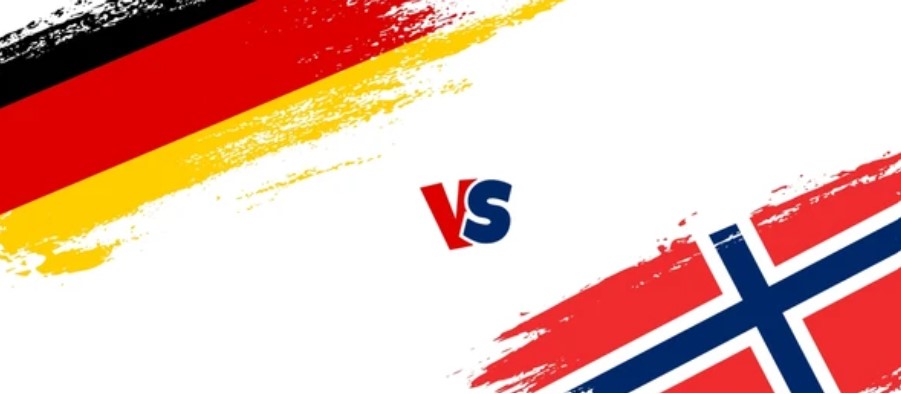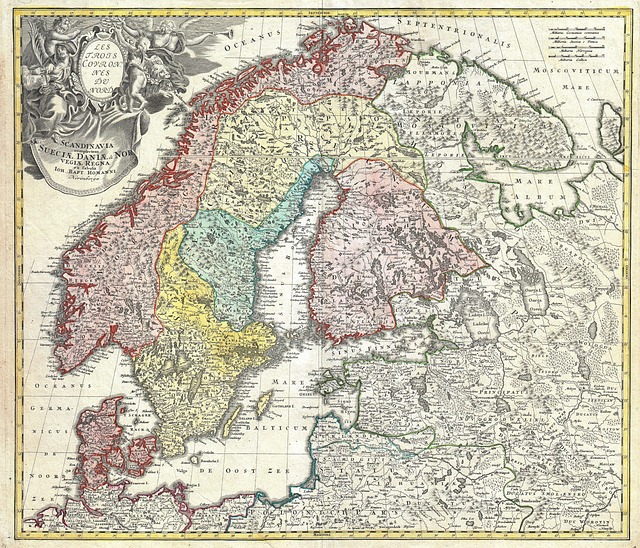
Is Norwegian A Germanic Language?
Norwegian is one of many Germanic languages. It has it’s roots in the proto-Germanic language that was spoken in Europe thousands of years ago. Though the language might share it’s roots with many others, the development of different dialects and deviations make it a unique language. Nevertheless, you will find some common denominators with the other Germanic languages that will help you pick up the language quickly.

Key takeaways
- Norwegian is a Germanic language
- It belongs to the North Germanic language branch of the Germanic language tree
- Norwegian is not similar to German except for in some small areas
- Speaking German might not help you learn Norwegian quicker, but English will
- Speaking Norwegian will help you communicate with Swedes and Danes too
- Norwegian is the easiest of the Nordic languages to learn
Is Norwegian A Germanic Language?
Yes, Norwegian, along with 47 other languages belong to the family of Germanic languages. What does this mean exactly? Well, being a Germanic language does not mean that it’s a language based on German, but rather that all these languages share a common ancestor in the proto-Germanic language dating back to more than 500 years B.C!
Within today’s Germanic languages, we have several sub-families. These are:
- West Germanic languages (with languages like English, German and Dutch)
- East Germanic languages (with languages spoken by European tribes)
- North Germanic languages (here we find Norwegian, Danish, Swedish, Icelandic and Faroese)
Given that the Germanic languages need to go back thousands of years for their common ancestor, means that there has naturally been some divergence between the languages. That is why we can’t understand all the other Germanic languages with ease if we speak one of them.
But within the sub-divisions we do find plenty of similarities.
Norwegian, being part of the North Germanic language tree, springs out of Old Norse. In fact, all the North Germanic languages are relatively similar. Meaning you can understand much of all of them if you only speak one language fluently. This makes learning Norwegian especially advantageous as it’s the easiest of the North Germanic languages, and a middle point between all of them. So learning Norwegian will let you comprehend the other North Germanic languages too!
Norwegian And German: Are They Similar?
Unfortunately, while they are both Germanic languages, Norwegian and German are quite different. As with all Germanic languages, you’ll find some similarities, but the differences outweigh the similarities. However, in that Norwegian is North Germanic and German is West Germanic, there have been several hundred years where the languages have diverged from each other and taken on different rules and characteristics.
They both share some common vocabulary and cognates, so knowing some words in either language will help you in understanding a little of the other. Take a look at these words for example:

But knowing some vocabulary doesn’t mean much if you’re not able to work it into a comprehensible sentence. This is where things get tricky.
Norwegian and German have very different syntax. Meaning how sentences and words within them are structured. So knowing all the words in either language doesn’t mean you’ll know what order they should appear in. Additionally, pronunciation is also quite different between the two. Norwegian has three letters (Æ,Ø & Å) not used in German, and German has four (Ä, Ü, Ö & ẞ) not used in Norwegian. These letters all produce different sounds, so this is another hurdle you’ll have to overcome.
Learn fluent Norwegian in 4 months. Start today.
Did you know that you don’t need all the grammar to speak fluent Norwegian? In our classes we focus just on the necessary vocabulary. So you can learn 3 times faster.
How To Learn Norwegian If You Know German
As we mentioned above, you’ll have some advantages in learning Norwegian if you speak German. Namely, the similarities in the vocabulary. However, you’ll have plenty of hurdles to overcome as well.
We mentioned how similar vocabulary will give you a step up as you’ll find plenty of Norwegian words that you intuitively understand because of your German-speaking abilities. But this applies to all Germanic languages really. The syntax is much more different.
In fact, Norwegian syntax is much closer to English than German. And good news, you already speak English if you’re reading this! So why not use your knowledge of English syntax and German vocabulary as a double whammy to help you tackle Norwegian at a record pace!
If you want to use your knowledge of other languages to help you learn Norwegian, why not join one of the many conversation classes we offer? Here you’ll learn Norwegian by talking to other learners, many of whom will share your native language, and with native teachers that’ll help you along your journey.

How Long Does It Take To Learn Norwegian If You Speak German?
There are many factors that determine how fast you can learn a new language. These are things like your motivation, available resources, knowledge of other languages, your ability to immerse yourself, and most importantly consistency. However, some estimates on hours needed to learn a new language can be assumed based on which languages you already speak. For Norwegian, the number of hours is usually between 600-800 hours.
This number is what the Common European Framework of Reference for Languages (CEFR) expects the average German speaker to need in order to learn Norwegian. For English speakers, this number is the same, but on the lower end of the spectrum, so again, your English knowledge is a bigger advantage in learning Norwegian.
Learn fluent Norwegian from your level
Check your level now, and find the right course for you
Our classes has native Norwegians who knows how it feels to learn a language, and will do everything to help you.
Nordic Languages And Their Germanic Roots
The Nordic languages consist of Norwegian, Swedish, Danish, Icelandic, and Faroese. Though you might assume Finnish is one too, it does not qualify. All the Nordic languages are North Germanic, while Finnish is a Uralic language and is completely different from the other Nordic languages. The remaining languages can also be referred to as the Scandinavian languages.
The other Nordic languages share many similarities in grammar, vocabulary, and syntax and all originate from Old Norse. Icelandic most closely resembles Old Norse today. But we can further divide the Nordic languages into two sub-categories.
- West Scandinavian (Icelandic, Faroese & Norwegian)
- East Scandinavian (Swedish & Danish)
However, no matter how you divide these languages, or how many sub-categories we have, they are all Germanic languages with their roots in the ancient proto-Germanic language spoken thousands of years ago. Various dialects and historical events eventually evolved into the different languages that we see used today.

Interesting Things To Know About North Germanic Languages
The North Germanic languages all share their roots in the Old Norse spoken by Vikings! That’s pretty cool to think about, right? After centuries of dialectical evolution coupled with major historical events, the Old Norse evolved into the Scandinavian languages we have today. But what makes them unique?
Well, for one, the pronunciation is somewhat special. That is if you mainly speak English. There is a wider range of vowel sounds than an English speaker might be used to. Take the letter Ø in Norwegian, for example. Though there might be some approximations, the exact sound of this letter does not exist in English.
Articles also vary. English only has one gender, meaning you don’t need to worry about which article you use in the definite or indefinite forms of nouns. You have “the” (definite) or “a/an” (indefinite).
The Nordic languages, however, have three genders! (except Danish, which only has two). So you need to know the gender of the noun in order to add the right article before indefinite nouns (en,ei, or et in Norwegian). Additionally, you don’t have a definite article, but rather tack on an ending to a definite noun, which has to correspond with the gender of the noun (en, ei, or et in Norwegian). Complicated right?
The case system in Icelandic is also unique. Icelandic has 4 noun cases. These are normative, accusative, genitive and dative. This means that a noun’s role in a sentence determines which form it should take.
So there is a lot to think about with the Nordic languages. And though they might share the same roots as with all the other Germanic languages, their uniqueness makes them a branch of their own on the Germanic language tree.
Reach fluent Norwegian in only 4 months
Find out your level and how to get started now
Did you know that you don’t need all the Norwegian grammar to speak Norwegian? Just a small part of it. In our classes we use just the necessary grammar. Find out what level you are, and what classes you can take to speak fluently.
Mutual Intelligibility Among Nordic Languages
Mutual intelligibility simply means speakers of different languages being able to communicate with each other. We’ve discussed that though all the Germanic languages stem from the same ancient roots, they are quite different today. However, the Nordic languages, while different, still resemble each other enough to where their speakers can communicate relatively easily.
This only really applies between Norwegian, Swedish and Danish. Icelandic is the outlier here, as the country’s isolated position has caused the language to deviate more from the others. Norway, Denmark and Sweden, on the other hand, are all geographically close to each other, meaning their languages are still relatively similar.
Norwegian is the most interesting case here. Given the country’s history under Danish rule, and then in a union with Sweden, we have been influenced by both languages for centuries. This means that Norwegian is the perfect middle ground between these three languages. In such, Norwegian speakers can communicate easily with both Swedes and Danes, and they in turn are able to understand Norwegian relatively well. But, Swedes and Danes are not able to communicate with each other with the same amount of ease.
This essentially means that by choosing to learn Norwegian, as opposed to Swedish or Danish, you’ll be able to communicate with all the Scandinavian language speakers (except Icelandic). So though Norwegian might not be the language with the most speakers, you will have a larger reach by knowing it. So it’s a buy one get three type of deal.
Which North Germanic Language Is Easiest To Learn?
Norwegian has the honor of ranking as the easiest of the North Germanic languages. There are several reasons for that, and as we stated above, it is also the most useful language to learn in terms of being able to communicate with speakers of the other Nordic languages. We won’t mention Icelandic here because it’s just too different from the other Nordic languages and English to be considered.
Firstly, Norwegian’s pronunciation is easier to get a grasp on than the others. Danish for example has notoriously difficult pronunciation. In fact, in Norway, we say that it sounds like they have a potato lodged in their throats when they speak. When it comes to Swedish, it may be easier than Danish, but the intonation of the language is more complex than Norwegian.
Norwegian also shares many similarities with English, and you’ll find plenty of cognates that will help you intuitively understand a lot of Norwegian words. While this may be true for Danish and Swedish too, the Norwegian vocabulary is a tad more similar to English than the others.
Lastly, the grammar is fairly simple to understand. Sure some things may confuse or even anger you, but for the most part, Norwegian grammar is relatively close to English. We’re talking in terms of syntax and vocabulary here.
So if you’re looking for ease, Norwegian is definitely the way to go! And why not try out learning Norwegian using our conversation classes?
Learn fluent Norwegian in 4 months. Start today.
Did you know that you don’t need all the grammar to speak fluent Norwegian? In our classes we focus just on the necessary vocabulary. So you can learn 3 times faster.
Frequently Asked Questions About Norwegian A Germanic Language
Is Norwegian A Germanic Language?
Yes, Norwegian is a Germanic language. It falls underneath the Nordic branch of the Germanic language tree along with Swedish, Danish, Icelandic and Faroese.
Norwegian And German: Are They Similar?
Norwegian and German, both being Germanic languages, may share some similarities in vocabulary, but their grammar system is quite different. Meaning that knowing German might help you understand some Norwegian words here and there, but won’t help you in constructing sentences correctly.
Learn fluent Norwegian in 4 months. Start today.
Did you know that you don’t need all the grammar to speak fluent Norwegian? In our classes we focus just on the necessary vocabulary. So you can learn 3 times faster.
